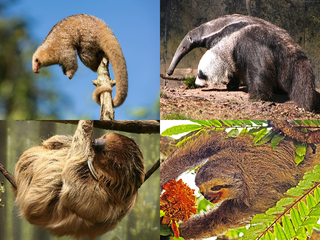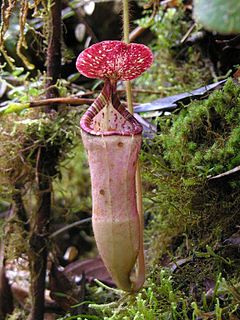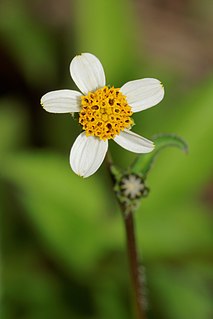Related Research Articles

Hicksbeachia is a genus of two species of trees in the family Proteaceae. They are native to rainforests of northern New South Wales and southeastern Queensland. They are commonly known as red bopple nut or beef nut due to the bright red colour of their fruits.

The order Pilosa is a clade of xenarthran placental mammals, native to the Americas. It includes the anteaters and sloths, including the extinct ground sloths, which became extinct about 10,000 years ago. The name comes from the Latin word for "hairy".

Nepenthes pilosa is a tropical pitcher plant endemic to Borneo. It is characterised by a dense indumentum of long yellow-brown hairs. Pitchers have a distinctive hook-shaped appendage on the underside of the lid. The specific epithet derives from the Latin word pilosus, meaning "hairy".

Bidens pilosa is an annual species of herbaceous flowering plant in the daisy family Asteraceae. Its many common names include black-jack, beggarticks, farmer’s friends and Spanish needle, but most commonly referred to as cobblers pegs. It is native to the Americas but is widely distributed as an introduced species in other regions worldwide including Eurasia, Africa, Australia, South America and the Pacific Islands.

Grevillea pilosa is a low growing shrub which is endemic to the south-west of Western Australia. It grows to between 0.4 and 1 metre in height and produce red or pink flowers between June and December in its native range.

Genista pilosa, commonly known as hairy greenweed, silkyleaf broom, silkyleaf woadwaxen and creeping broom, is a plant species in the genus Genista. It is 30–45 centimetres (12–18 in) tall and has green coloured stems. It has yellowish coloured flowers which grow in 1-3 pairs. It grows in western and central Europe in poor, dry, sandy, and stony soils.
Hicksbeachia pilosa is a small tree in the family Proteaceae. This rare species is endemic to the rainforests of the wet tropics region of northeastern Queensland, Australia. It was first described in 1988 by Australian botanist Peter H. Weston, after a collection by Garry Sankowsky and Peter Hind in 1986 at Bobbin Bobbin Falls in North Queensland. Its specific name is the Latin adjective pilosus "hairy".

Luzula pilosa is a species of flowering plant in the rush family Juncaceae with the common name hairy wood-rush. The plant is native to northern Europe and western Asia.

Crossotini is a tribe of longhorn beetles of the subfamily Lamiinae. It was described by Thomson in 1864.
Lasiocercis is a genus of longhorn beetles of the subfamily Lamiinae.
Lasiocercis rufotibialis is a species of beetle in the family Cerambycidae. It was described by Stephan von Breuning in 1957.
Lasiocercis vadoni is a species of beetle in the family Cerambycidae. It was described by Stephan von Breuning in 1957.
Lasiocercis transversefasciata is a species of beetle in the family Cerambycidae. It was described by Stephan von Breuning in 1965.
Lasiocercis truncatoides is a species of beetle in the family Cerambycidae. It was described by Stephan von Breuning in 1975.
Lasiocercis madagascariensis is a species of beetle in the family Cerambycidae. It was described by Stephan von Breuning in 1945.
Lasiocercis ochreopicta is a species of beetle in the family Cerambycidae. It was described by Stephan von Breuning in 1980.
Lasiocercis catalai is a species of beetle in the family Cerambycidae. It was described by Lepesme and Villiers in 1944.
Lasiocercis posticefasciata is a species of beetle in the family Cerambycidae. It was described by Lepesme and Villiers in 1944.
Lasiocercis fasciata is a species of beetle in the family Cerambycidae. It was described by Waterhouse in 1882.
Lasiocercis limbolaria is a species of beetle in the family Cerambycidae. It was described by Fairmaire in 1894.
References
- ↑ BioLib.cz - Lasiocercis pilosa. Retrieved on 8 September 2014.